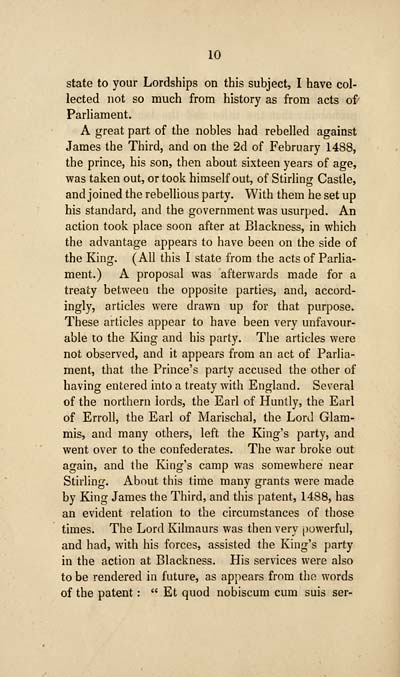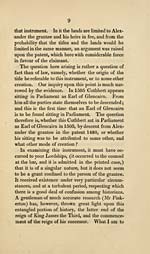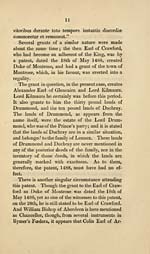Reports of claims preferred to the House of Lords in the cases of the Cassillis, Sutherland, Spynie, and Glencairn peerages
(152) Page 10
Download files
Complete book:
Individual page:
Thumbnail gallery: Grid view | List view

10
state to your Lordships on this subject, I have col-
lected not so much from history as from acts of
Parliament.
A great part of the nobles had rebelled against
James the Third, and on the 2d of February 1488,
the prince, his son, then about sixteen years of age,
was taken out, or took himself out, of Stirling Castle,
and joined the rebellious party. With them he set up
his standard, and the government was usurped. An
action took place soon after at Blackness, in which
the advantage appears to have been on the side of
the King. (All this I state from the acts of Parlia-
ment.) A proposal was afterwards made for a
treaty between the opposite parties, and, accord-
ingly, articles were drawn up for that purpose.
These articles appear to have been very unfavour-
able to the King and his party. The articles were
not observed, and it appears from an act of Parlia-
ment, that the Prince's party accused the other of
having entered into a treaty with England. Several
of the northern lords, the Earl of Huntly, the Earl
of Erroll, the Earl of Marischal, the Lord Glam-
mis, and many others, left the King's party, and
went over to the confederates. The war broke out
again, and the King's camp was somewhere near
Stirling. About, this time many grants were made
by King James the Third, and this patent, 1488, has
an evident relation to the circumstances of those
times. The Lord Kilmaurs was then very powerful,
and had, with his forces, assisted the King's party
in the action at Blackness. His services were also
to be rendered in future, as appears from the words
of the patent : " Et quod nobiscum cum suis ser-
state to your Lordships on this subject, I have col-
lected not so much from history as from acts of
Parliament.
A great part of the nobles had rebelled against
James the Third, and on the 2d of February 1488,
the prince, his son, then about sixteen years of age,
was taken out, or took himself out, of Stirling Castle,
and joined the rebellious party. With them he set up
his standard, and the government was usurped. An
action took place soon after at Blackness, in which
the advantage appears to have been on the side of
the King. (All this I state from the acts of Parlia-
ment.) A proposal was afterwards made for a
treaty between the opposite parties, and, accord-
ingly, articles were drawn up for that purpose.
These articles appear to have been very unfavour-
able to the King and his party. The articles were
not observed, and it appears from an act of Parlia-
ment, that the Prince's party accused the other of
having entered into a treaty with England. Several
of the northern lords, the Earl of Huntly, the Earl
of Erroll, the Earl of Marischal, the Lord Glam-
mis, and many others, left the King's party, and
went over to the confederates. The war broke out
again, and the King's camp was somewhere near
Stirling. About, this time many grants were made
by King James the Third, and this patent, 1488, has
an evident relation to the circumstances of those
times. The Lord Kilmaurs was then very powerful,
and had, with his forces, assisted the King's party
in the action at Blackness. His services were also
to be rendered in future, as appears from the words
of the patent : " Et quod nobiscum cum suis ser-
Set display mode to:
![]() Universal Viewer |
Universal Viewer | ![]() Mirador |
Large image | Transcription
Mirador |
Large image | Transcription
Images and transcriptions on this page, including medium image downloads, may be used under the Creative Commons Attribution 4.0 International Licence unless otherwise stated. ![]()
| Histories of Scottish families > Reports of claims preferred to the House of Lords in the cases of the Cassillis, Sutherland, Spynie, and Glencairn peerages > (152) Page 10 |
|---|
| Permanent URL | https://digital.nls.uk/95013726 |
|---|
| Description | A selection of almost 400 printed items relating to the history of Scottish families, mostly dating from the 19th and early 20th centuries. Includes memoirs, genealogies and clan histories, with a few produced by emigrant families. The earliest family history goes back to AD 916. |
|---|

